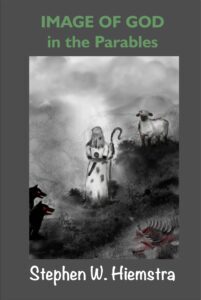The Friend at Midnight

And he arose and came to his father.
But while he was still a long way off,
his father saw him and felt compassion,
and ran and embraced him and kissed him.
(Luke 15:20)
By Stephen W. Hiemstra
One attribute of God is revealed most directly in the Parable of the Two Brothers: multiplication. When the younger son took steps to confess his sin to this father, the father took many steps to forgive him and to express his love. This overwhelming generosity appears throughout scripture, but it especially seen in the Gospel of John in the wine produced at the Wedding at Cana (John 2:6-10), the bread multiplied in the feeding of the five thousand (John 6:5-14), and the disciple’s catch of fish in Galilee (John 21:4-13). God is not stingy with his love.
Seeker Love
A contemporary example of God’s super-generous love arises in the context of faith denial. In Jesus’ Parable of the Two Brothers, at first neither brother loves his father. The younger brother hates his father so much he demands his inheritance while his father is still alive. The older brother practices a more insidious form of hatred: He pretends to love his father while secretly hating him, which leaves no door open to reconciliation. When the younger brother returns to his father, he opens the door to reconciliation out of his own need and shame, but only the tiniest bit—this is still not love. At best, it is a test of his father’s love.
We see a similar test of God’s love in Pascal’s Wager. Blaise Pascal (1623-1662), a French mathematician, used probability theory to argue that the agnostic argument is logically false in that faith is a fair bet. If God exists and you believe, then you win heaven, but if God does not exist, you loose nothing. In other words, faith in God has a positive reward provided the probability of God existing is a positive, non-zero number. Betting that God exists is accordingly offers better odds than organized gambling, where the house normally earns a substantial profit, suggesting that the odds in betting are negative—not a fair bet.
Pascal’s Wager does not engender faith, but it offers an opportunity to take faith seriously, out of pecuniary benefit—winning a bet. If faith is a fair bet, then the person considering Pascal’s Wager has to wonder why. Taking the next step—placing the bet—is a try-before-you-buy or fake-it-until-you-make-it kind of faith commitment. If a world where faith in God is treated as philosophical nonsense and dismissed out of hand, this step defines one as a seeker.
Do you think that our generous God, who is known for his overwhelming love, would ignore such a seeker? On the contrary, the Parable of the Two Brothers suggests that God will run to meet us.
Parable of the Friend at Midnight
The Parable of the Two Brothers is not Jesus’ only parable of extraordinary love. Consider:
And he said to them, Which of you who has a friend will go to him at midnight and say to him, Friend, lend me three loaves, for a friend of mine has arrived on a journey, and I have nothing to set before him; and he will answer from within, Do not bother me; the door is now shut, and my children are with me in bed. I cannot get up and give you anything? I tell you, though he will not get up and give him anything because he is his friend, yet because of his impudence he will rise and give him whatever he needs. (Luke 11:5-8)
What is love? Love is being willing to help a friend only because he asked, no matter how inconvenient. The word for imprudence is also translated as persistence (NAS), shameless audacity (TNIV), and importunity (KJV).
Jesus uses this parable to introduce one his most famous statements: “And I tell you, ask, and it will be given to you; seek, and you will find; knock, and it will be opened to you. For everyone who asks receives, and the one who seeks finds, and to the one who knocks it will be opened.” (Luke 11:5-10) Love means that with God one always has access. One of the hardest ministries to appreciate and understood is the ministry of presence. With God, we are never alone.
The ministry of presence is a gift we can then extend to others.
The Friend at Midnight
Also see:
The Face of God in the Parables
The Who Question
Preface to a Life in Tension
Other ways to engage online:
Author site: http://www.StephenWHiemstra.net
Publisher site: http://www.T2Pneuma.com
Newsletter at: https://bit.ly/Adv_2024, Signup
The post The Friend at Midnight appeared first on T2Pneuma.net.



